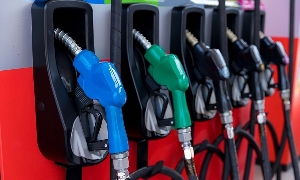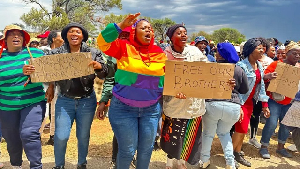Weija (G/A), Sept. 2, GNA - The Ghana Water Company Limited (GWCL) spends 2.2 billion cedis every month on chemicals, to treat water from the Weija Lake due to the widespread pollution of the water resource through human activity.
The pollution is caused by rampant and unchecked encroachment of the shorelines by estate developers, sale of land along the catchment area acquired and paid for by the Government.
Mr Samuel Odartey Lamptey, Managing Director of the GWCL, made this known to Vice President Alhaji Aliu Mahama when he visited a reforestation programme being executed by the British American Tobacco (BAT) along the Lake in the Greater Accra Region.
He said encroachment of the shorelines had affected the capacity of the dam, explaining that when the facility was constructed in 1974 it was producing 70 million gallons of water a day, but currently it produced only 42 million gallons a day.
Mr Lamptey said 28 million gallons were lost through soil erosion, evaporation and pollution of the Lake.
He said the Government had paid 2.19 billion cedis to the people of Joma as part of efforts to resettle communities living along the Lake. Mr Lamptey said the programme had suffered a hitch because the traditional Leaders of the community contracted a land valuation expert, who said the compensation due to them was 55 billion cedis.
In 1977, Government placed approximately 5,364 hectares including the Lake and surroundings, area under protection.
Officials of BAT and Trees For The Future Ghana, a nongovernmental organisation (NGO) operating the reforestation project conducted Vice President Mahama round to see the expansive activity of land developers, farmers and other others engaged in different activities. Vice President Mahama directed the Regional Coordinating Council to hold an emergency meeting with the custodians of lands along the Lake to halt the pollution.
He said communities within the catchment area should be educated about the dangers of their activities.
Alhaji Mahama said the media should assume a front role in educating the citizenry to take up the responsibility of protecting water sources, adding: " Water is life".
Mr Samuel Kuwornu, Executive Director of the NGO, said based upon the recommendation of the GWCL; the Ministry of Environment approached BAT to initiate the project to change climatic condition along the Lake and to preserve the biodiversity.
He said BAT had committed 1.3 billion cedis to the project, which started in 1999 and so far 340,800 trees had been planted. Mr Kuwornu said 6.27 hectares and 10,023 trees had so far been destroyed through human activities.
He said about 19 hectares of the shoreline had been lost through encroachment because of the lack of clarity regarding land ownership, claims by the indigenes of non-payment of compensation by the Government.
He said people working on the reforestation project, were being harassed by land guards.
Mr Kuwornu called on the Government to declare between 200 metre and 300 metres of the shoreline as protected areas. Mr Bernard Mavambu, Managing Director of BAT, said the company had supported communities in the Brong Ahafo Region to plant more than four million trees as part of its social responsibility.
General News of Friday, 2 September 2005
Source: GNA
















